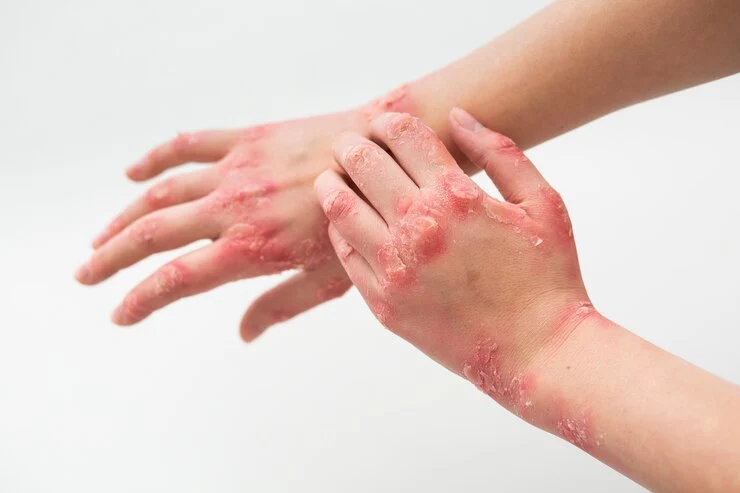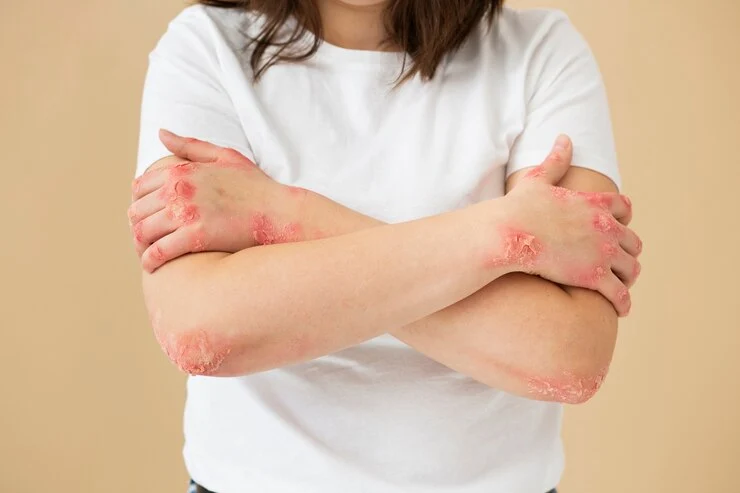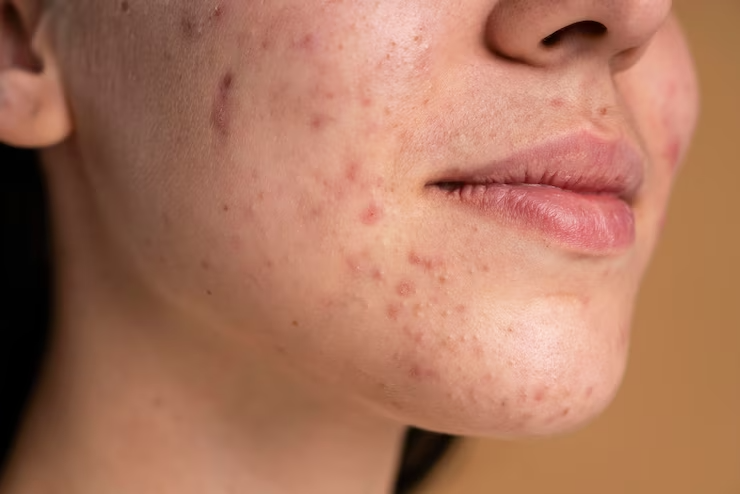According to Ayurveda, health can be achieved by balancing the mind, body, and spirit. Ayurvedic treatments can effectively manage skin conditions such as eczema, psoriasis, and acne. Below are some Ayurvedic remedies for some common skin disorders
Eczema
Eczema is a skin disorder characterized by red, itchy skin and can also cause papules and vesicles. It is believed that an overreaction of the immune system to irritants triggers the symptoms. Additionally, hereditary and environmental factors have been associated with the disease. Eczema treatment in Ayurveda involves administering oral medications for purification, followed by the external application of medicines.

Rasayanas are provided to rejuvenate and nourish the skin. Various therapies can be used to treat eczema, including Snehana, which involves using medicated ghee or sesame oil for a week. Mild sweating procedures can be done following Snehana. Vamana or therapeutic emesis is recommended for eczema with symptoms like swelling, oozing, and itching. Mridu Virechana (mild purgation) using medicated laxatives prevent symptoms such as burning sensations and pus formation. If these procedures do not reduce the signs and symptoms, Rakta Sodhana, which involves bloodletting by tools or leeches, may be performed.
To manage eczema, avoid exposure to allergens and irritants, such as harsh soaps, detergents, and synthetic fabrics. Applying a mixture of neem oil and turmeric to the affected area can also be beneficial. Neem oil is a natural anti-inflammatory and antifungal agent, while turmeric has anti-inflammatory and antioxidant properties. A paste of sandalwood powder and water can also be applied to soothe irritated skin. Before bed, drinking chamomile tea can help relieve your stress, which can trigger flare-ups of eczema.
Also Read: Understanding the Symptoms and Causes of Eczema
Psoriasis
Psoriasis is a non-contagious skin disease that results in red patches with white scales, caused by an overgrowth of cells in the basal layers of the skin. This disease occurs due to imbalances of the Vata and Pitta doshas, leading to the accumulation of toxins in various tissues of the body. Ayurvedic psoriasis treatment aims to eliminate toxins from the blood and tissues while restoring digestive balance. Treatment methods may include Snehana (medicated ghee therapy), Basti (medicated enemas), and detox therapies such as Virechana and Vamana (therapeutic emesis and purgations). Thakradhara, in which medicated buttermilk or decoction is dripped over the forehead, may also be used for Pitta-dominant Psoriasis.

To manage psoriasis, avoid exposure to cold weather, dry air, and stress, as these can trigger flare-ups. Applying aloe vera gel to the affected area can reduce redness and itching. A paste of turmeric and sesame oil can also be applied to the affected area. Turmeric has anti-inflammatory properties, while sesame oil has moisturizing properties. Drinking a cup of ginger tea every morning can help reduce inflammation associated with psoriasis.
Acne
Teenagers often suffer from acne vulgaris due to overactive oil glands. The onset of puberty triggers excess sebum secretion, which blocks skin pores, and inflamed hair follicles, and leads to a series of skin disorders. Congested pores worsen the condition due to the build-up of dirt, dry skin, and bacteria, which can result in severe scarring in chronic cases.
In Ayurvedic medicine, acne is treated by addressing vitiated blood or Rakta Dushti and the subtle channels of the body. Steam treatment clears blockages in subtle channels, while Vamana or emesis therapy involves the oral administration of herbs to induce vomiting to remove blockages of Srothas in the facial skin and the entire body. Induced purgation or Virechana therapy reduces the vitiated Pitta and Rakta in the body using bitter, astringent, and sweet herbal purgatives.

Nasal administration of Ayurvedic medicine (Nasya) through the nose is used to treat chronic acne conditions. Raktamokshana therapy removes stagnated blood, responsible for pathological changes, through para-surgical procedures such as letting blood through leeches, Prachanna Karma, and Siravyadha. This therapy improves microcirculation to tissues by removing vitiated and stagnated blood.
To prevent acne breakouts, it is recommended to avoid eating oily and spicy foods. A mixture of turmeric and honey can also be applied to the affected area. Turmeric has antibacterial properties that can reduce acne-causing bacteria, while honey has anti-inflammatory and antibacterial properties. A paste of sandalwood powder and rose water can also be applied to the affected area. Sandalwood has anti-inflammatory properties, while rose water helps soothe irritated skin. Green tea has antioxidant properties which can reduce inflammation associated with acne if you drink a cup every day.
Ayurvedic Psoriasis Treatment at Raha Ayurveda
Raha Ayurveda stands out as a premier destination for individuals seeking effective Ayurvedic treatment for psoriasis in Kerala. By integrating traditional therapies, dietary modifications, stress management techniques, and modern medical insights, Raha Ayurveda not only alleviates symptoms but also fosters long-term well-being.
Leave a Reply